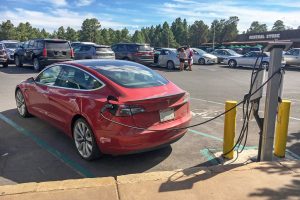By Matt Tomlin
Last week, the government’s target to ban all new purchases of petrol and diesel cars by 2040 came under fire by MPs who claimed the target to be too far in the future. Many were saying that the ban should become fully effective by 2032 instead.
The concerns come as climate change has been a significant topic in the news recently, with scientists warning that a 2C average global temperature rise and related global warming catastrophe can only be avoided within the next 11 years. As well as this, air pollution in British towns and cities is being cited as a major health problem, with some places having EU illegal levels of air pollution and costing the country thousands of deaths and avoidable costs in healthcare each year.
In Wales, Cardiff, Swansea and Port Talbot have been found to possess high levels of air pollution. A road in Caerphilly is also under threat of demolition because of high air pollution caused by traffic supposedly making it somewhat unsafe to live on.
There is also the need for Wales to be host to higher numbers of electric vehicles and their necessary charging points which are of note in debates about both climate change and air pollution. According to Nia Griffith, Labour MP for Llanelli, the National Trust have already set a good example in Wales by putting charging points in their public car parking sites, and she suggests that more public places should be encouraged to do so.
It isn’t only Griffith who believes this to be the way forward for transport in Wales. A report recently emerged suggesting that across the UK 3 million more public charge points for electric vehicles would need to be installed in public places such as motorway service stations and supermarkets over the coming decades to meet demand. This is due to only 60% of UK homes being currently viable for the installation of domestic charging points for electric vehicles.
With a climate catastrophe and the continuation of the negative health effects of air pollution appearing to be increasingly plausible threats in an era of little and delayed action, increased UK government participation in and funding of electric vehicles, it would seem, would be a necessary solution to part of the problem.








Add Comment